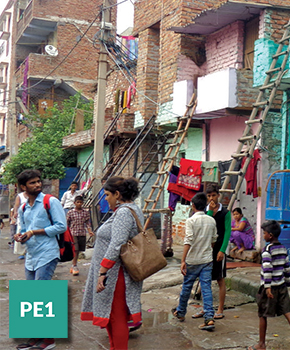
Making Home-based Work Environments Safer, Healthier and Productive: Improving the Physical Environment (Brief 1)
This brief was created by City Collab as a part of WIEGO’s documentation of Mahila Housing Trust’s (MHT) work to capture insights on their work that has had wide ranging impacts on the wellbeing and economic productivity of home-based workers. This brief on optimizing living and work spaces is the first thematic brief in the ‘Improving the physical environment’ category.
Houses in slums and informal settlements in India are very small and congested. On average, an urban slum dwelling unit size in Dharavi, Mumbai is just 12 sq m (Gulankar, 2020). Lack of adequate space to work and store goods adversely affects the earning capacity of women home-based workers, who are frequently interrupted with domestic chores during work hours. Additionally, weak walls, leaky roofs, hard uneven flooring, or absence of flooring makes the work environment inconvenient, bringing in dust, dirt, insects, and making their homes prone to flooding. This brief provides details on how MHT supports home based workers to optimize and expand living and working space through efficient layout, design and incremental upgradation.
